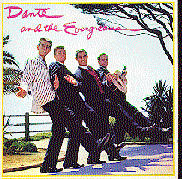Shortly thereafter, Madison hit with a rock and roll classic, the Viscounts' "Harlem Nocturne" [Madison 123], which made #52 at the beginning of 1960, but #39 in 1965 when it was reissued on Amy. The Viscounts were an instrumental quintet from New Jersey, including Harry Haller (tenor sax), Bobby Spievak (guitar), Joe Spievak (bass), Larry Vecchio (organ), and Clark Smith (drums). Despite the rather mediocre showing for "Harlem Nocturne" on the charts, it remains one of the most recognizable instrumentals of the rock era. The group also placed two followup instrumentals on the charts, "Night Train" [Madison 133], and "Wabash Blues" [Madison 130].
On the heels of "Harlem Nocturne," Uttal recruited a Los Angeles foursome led by Donald (Dante) Drowty to do a cover version of the Hollywood Argyles' "Alley Oop" [Madison 130]. Calling themselves Dante and the Evergreens, the group made #15 with the cover. They followed up with "Time Machine" [Madison 135], which only reached #77. Besides Drowty, the group included Tony Moon, Frank D. Rosenthal, and Bill Young.
The Bell Notes, a group from Long Island, New York, had already had a big hit on Shad with "I've had It" when they were signed to Madison in 1960. They started with a rock and roll remake of the old children's song "Shortnin' Bread" [Madison 136] in August, 1960, but it only reached #96, primarily due to competition from another version, by Paul Chaplain and the Emeralds on the Harper label. The two followup singles by the group fared even worse.
Gary Stites, another artist who had previously had chart success on another label, came to Madison from the Carlton label. His two 45s on Madison, "Young Love"/"Little Tear" [Madison 138] and "Little Lonely One"/"Honey Girl" [Madison 155] failed to chart.
In Chicago in 1961, radio station WLS had recently switched from a "Prairie Farmer" format to teenage rock and roll. Dick Biondi, a wild deejay imported from Buffalo to do early evenings, used various phrases on his show. One of these, taken from an old Terry Noland song, was "There's a fungus among us." The phrase caught on in Chicago, and Biondi persuaded Hugh Barrett to do a remake of the song so that Biondi could plug it on his show. The version of "There's a Fungus Among Us" by Hugh Barrett and the Victors [Madison 164] did little nationally, but was heard constantly on WLS, making their top-40 list.
In September, 1961, Madison had another mid-chart hit with Nino and the Ebbtides' reworking of the old Glenn Miller 1942 hit "Juke Box Saturday Night" [Madison 166]. The New York City vocal group consisted of Antonio (Nino) Aiello, Tony DiBari, Tony Imbimbo, and Vinnie Drago.
The final single issued on Madison is perhaps the most valuable of all to record collectors. Late in 1961, Uttal signed a young Paul Simon and a couple of his friends (Howie Beck and Mickey Borack) as Tico and the Triumphs. Just as their first single, "Motorcycle" [Madison 169], came out, Madison closed its doors. The master, along with Simon's contract, was sent to Amy Records. "Motorcycle" [Amy 835] stalled at #99 on the charts nationally, but did better in the New York area.
Larry Uttal closed shop at Madison mainly because he had bigger fish to fry, having purchased the Bell, Amy, and Mala labels.
There were only two albums released on Madison, one each by the Viscounts and Dante and the Evergreens. Both are highly collectable. The Viscounts album was later reissued in a somewhat modified form on the Amy label. There is no indication that anything recorded on Madison was recorded in stereo. Both the 1959 Tassels stereo single and the reissued Viscounts album on Amy were rechanneled.
 The Madison label is three-fourths white with black printing, the left quarter of the label is brown.
"madison" in orange above the center hole.
The Madison label is three-fourths white with black printing, the left quarter of the label is brown.
"madison" in orange above the center hole.
We would appreciate any additions or corrections to this discography. Just send them to us via e-mail at madison@bsnpubs.com. Both Sides Now Publications is an information web page. We are not a catalog, nor can we provide the records listed below. We have no association with Madison Records, which is currently inactive. Should you be interested in acquiring albums listed in this discography (which are all out of print), we suggest you see our Frequently Asked Questions page and follow the instructions found there. This story and discography are copyright 1999 by Mike Callahan.
 Madison Album Discography
Madison Album Discography Back to the Discography Listings Page
Back to the Discography Listings Page